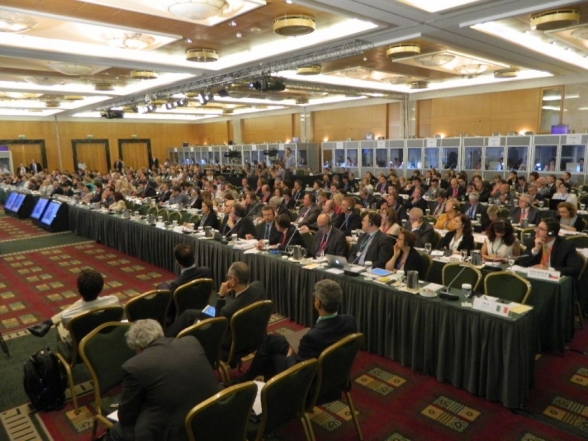Delegation of the Parliament of Montenegro, consisting of the following: Mr Slaven Radunović Chair of the Committee on European Integration; Mr Zoran Srzentić Deputy Chair, as well as a Committee member Mr Predrag Sekulić participate in the Plenary Session of the Conference of European Affairs Committees of Parliaments of the European Union - COSAC, which is held from 15 to 17 June 2014 in Athens,within the Hellenic presidency over the European Union.
The meeting was opened by the Speaker of the Hellenic Parliament Vangelis Meimarakis, who pointed out that the results of the recent elections for the European Parliament demonstrated that fall of confidence of citizens in the European Union has doubled. We are obliged, therefore, to point to European values, the importance of European policies that go beyond national ones, because citizens would like the Union to be closer to their problems. The meeting was addressed by the Prime Minister of the Hellenic Republic Antonis Samaras, who stated that Greece contributed to overcoming the problem, in order to get out of the crisis even stronger. Within the Hellenic presidency over the European Union, 67 legislative procedures were completed, a number of political documents of importance for the citizens adopted and the proposals for the Banking Union stated, aimed to promote development opportunities, cope with the crisis and unemployment. We expect that, during the Italian presidency, we would give a new direction to European institutions, and the problem of illegal immigration and the outflow of highly skilled labor force would be solved, said the Prime Minister of the Hellenic Republic.
Plenary Session was also addressed by the Chair of the Committee on European Integration Slaven Radunović, who spoke about the recently ended Montenegrin presidency over the Conference of Parliamentary Committees on European Integration/Affairs of the participating countries of the Stabilisation and Association Process for South-East Europe, within which the meeting was held, attended by Parliamentary delegation of five states in the region, representatives of regional initiatives and the diplomatic corps. Joint statement was unanimously adopted at the meeting, stating that cross-border dimension of cooperation represented means for strengthening the European integration processes and ensured political stability, security and economic development of the Western Balkans. Participants pointed out that strengthening the rule of law, improving the independence of the judiciary, respecting the principle of separation of powers and the principle of "brakes and balances" and the fight against corruption and organized crime was of crucial importance for the accession process. It was pointed out that unemployment in the Western Balkans region and in the EU states, especially among young people, was one of the biggest challenges facing decision makers, and planning and implementing sustainable and balanced local and regional development was necessary, as well as better coordination of state, industry and educational institutions, in order to find a model suitable to market needs.
The meeting was marked by the debate on the challenges of the European Union, through the example of the crisis in Ukraine, where the Chair of European Parliament's Committee on Foreign Affairs Elmar Brok stated that European foreign policy task so far was not the isolation of Russia, but the establishment of a trade partnership and the liberalization of the visa regime. The issue of gas export from Russia on the other hand comes out of the economy framework and enters security framework and the framework of political conditionality, which is the concern for everybody in the Union. In this regard, the need for the EU to make a special effort is expressed and to actively participate in resolving the Ukrainian crisis, in order to preserve the territorial integrity, peace and security.









